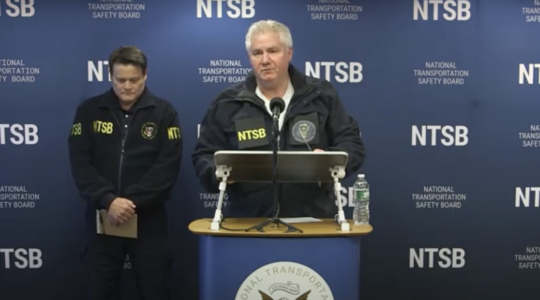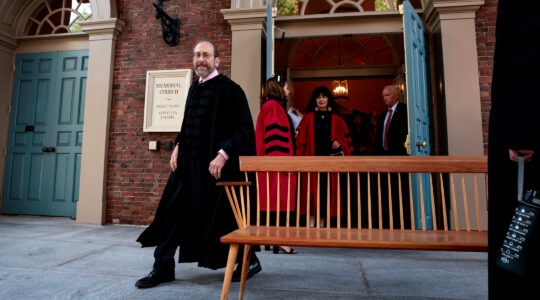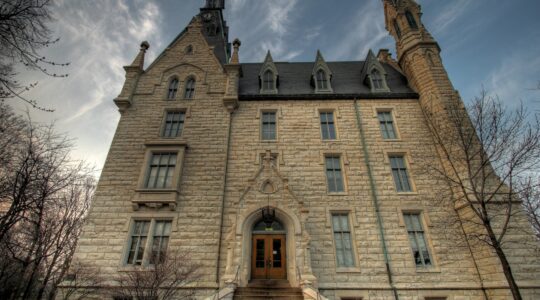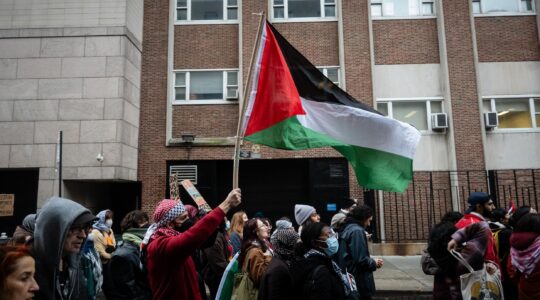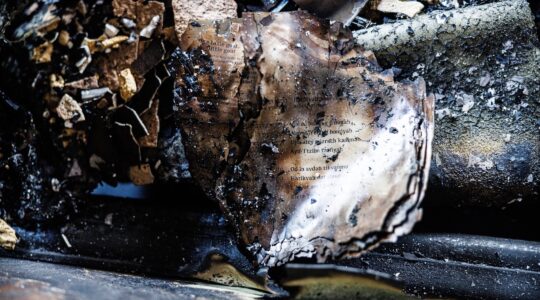A week after Seattle police determined that pro-Palestinian graffiti at a local Holocaust museum didn’t qualify as a hate crime, the center and six of its counterparts across the United States issued a joint statement denouncing the vandalism as a “straightforwardly antisemitic” act.
“The senseless scapegoating of Jews did not begin or end with the Holocaust. It’s been happening for thousands of years, and while the pretext may change, the antisemitic motivation is the same,” the seven centers said in a joint statement Monday.
The vandalism involved the phrase “Genocide in Gaza” being written over a photograph of a child Holocaust survivor. The vandalism occurred on June 18, according to the Seattle Police Department, which told the Jewish Telegraphic Agency that it was classifying the incident as “a non-criminal bias incident motivated by political ideology.”
Police said the message “was written in pen and was wiped off a front window without causing damage or expense.”
The department added, “No explicit threat was made. The motivation for the graffiti was anger over the policy and practice of the Israeli government.” The department declined to elaborate on whether it considered the targeting of Jewish buildings over anger at the Israeli government to be antisemitic.
The incident came as pro-Palestinian activists protesting the Israel-Hamas war are increasingly targeting, and blaming Israel’s actions on, Jewish institutions. An increasing number of synagogues and Jewish centers have been subject to protests and seen outbreaks of violence — including brawls breaking out at dueling protests in front of a Los Angeles synagogue last week and rocks being thrown through the windows of two Toronto-area synagogues over the weekend. Congregations in Seattle have also been targeted with anti-Israel graffiti both before and after Oct. 7.
But activists have rarely targeted Holocaust museums, even as pro-Palestinian groups have sought to draw comparisons between Israel’s military campaign in the Gaza Strip and the Nazis’ genocide of the Jewish people.
The museum leaders did not address the Seattle Police Department’s determination directly, but added in their statement that they “strongly condemn this crime – and we also recognize it as an opportunity to educate. Holding Jews – much less a Holocaust museum – responsible for the wartime actions of a foreign government is unacceptable and straightforwardly antisemitic.”
The statement also obliquely referenced the charges of genocide that activists have leveled against Israel, and that Israel has vehemently denied.
“Our mission to guard the memory of Holocaust Survivors and victims requires clarity on what does and does not constitute genocide, especially where misconceptions lead to hateful acts of antisemitism,” the statement reads.
But the Seattle center’s CEO, Dee Simon, told JTA on Monday that despite considering the graffiti antisemitic, the museum agreed with the SPD’s determination that it should not be classified as a hate crime — both because the perpetrator’s motivations were unknown and because the phrase was easily removed.
“What happened to our Center was wrong but it did not meet the threshold of a ‘crime’ in Seattle,” Simon wrote in an email. “According to our sources, the damage could be washed off and is not permanent and the intent of the perpetrator is not clear. Therefore this has been recorded as a bias incident.”
Simon added, “I wish the person who sprayed the graffiti on our building would have taken the time to learn the lessons shared in our museum.”
The six other Holocaust centers that co-signed the statement included the Museum of Jewish Heritage in New York; the Florida Holocaust Museum in St. Petersburg; and major Holocaust centers in L.A., Chicago, Detroit, and Cincinnati.
At least one of those museums, Detroit’s, has been separately caught up in controversy around the war: the museum’s leadership reportedly removed a survivor from its speakers series after he staged a protest outside the center with the anti-Zionist group Jewish Voice for Peace.
A different planned Seattle-area museum exhibit on antisemitism came under fire last month after workers at the Wing Luke Museum staged a walkout because they believed the material “conveyed Zionist perspectives.”
The Asian American, Native Hawaiian and Pacific Islander heritage museum temporarily shuttered; though leaders initially planned to reopen the exhibit at the end of June, they have since delayed it until later this summer and are exploring “alternative venues” for it owing to safety concerns, according to a statement on the museum’s website.
JTA has documented Jewish history in real-time for over a century. Keep our journalism strong by joining us in supporting independent, award-winning reporting.

